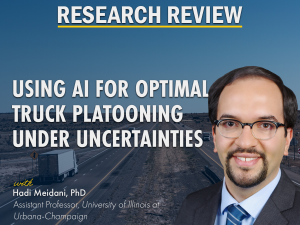Presented By: Center for Connected and Automated Transportation
Using Artificial Intelligence for Optimal Truck Platooning under Uncertainties
Hadi Mediani, PhD

Truck platooning is the process of using connected vehicle technology to join two or more trucks in a convoy. Platooning is associated with two, major societal benefits: environmental, through lowered fuel consumption, CO2 emission, and traffic efficiency, and safety improvement, through automated driving. Quantification of fuel consumption in platoons depends on the computational fluid dynamics (CFD) of the system, specifically the resistance or drag force of trucks. While optimization of fuel consumption is pivotal in truck platooning, analysis of CFD is computationally expensive, especially when uncertainties are present, due to geometrical variability of trucks and platoons as well as in wind magnitude and direction.
This research proposes an artificial intelligence-based surrogate model which enables near real-time optimization of platoon configurations based on fuel consumption and impacts on pavement conditions. Attendees will learn how a deep neural network (DNN) model can be trained using data from CFD simulations that utilize high-performance computing (HPC) resources.
This research proposes an artificial intelligence-based surrogate model which enables near real-time optimization of platoon configurations based on fuel consumption and impacts on pavement conditions. Attendees will learn how a deep neural network (DNN) model can be trained using data from CFD simulations that utilize high-performance computing (HPC) resources.